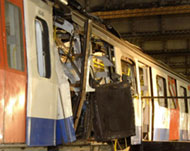London bombers were known to MI5
British security services had come across two men who went on to carry out last year’s July 7 bomb attacks on London but did not believe them to be urgent threats, a parliamentary committee has reported.

Mohammad Sidique Khan and Shehzad Tanweer were among four British men who set off rucksack bombs on three underground trains and a double-decker bus, killing 56 people, including the bombers, and wounding more than 700.
The attacks took place as Tony Blair, the prime minister, hosted a gathering of Group of Eight world leaders in Scotland.
Security officials had lowered the general threat level to the country two months before the attack.
The British parliament’s intelligence and security committee said the Security Service – commonly known as MI5 – had come across Khan and Tanweer “on the peripheries of other surveillance and investigative operations”.
Limited resources
But the committee said it was understandable that intelligence officials had not pursued the two men, given their limited resources and other urgent priorities.
 |
|
The blasts killed 56 people |
“At that time, their identities were unknown to the Security Service and there was no appreciation of their subsequent significance,” the committee’s report into the attacks said.
“As there were more pressing priorities at the time, including the need to disrupt known plans to attack the UK, it was decided not to investigate them further or seek to identify them.
“In light of the other priority investigations being conducted and the limitations on Security Service resources, the decisions not to give greater investigative priority to these two individuals were understandable.”
Whitewash denied
The committee denied that it was a “whitewash” after clearing the police and the intelligence services of any culpable failings.
George Howarth MP, an Intelligence and Security Committee (ISC) member, told a press briefing that he “objects to the phrase whitewash”.
“Had there been a culpable failure, we would have said so,” he said.
|
“There was no culpable evidence of failure on the part of the agencies. Our view is that it was understandable that the leads were not taken any further” Paul Murphy |
Paul Murphy, the ISC chairman, said the report focused on what was missed by the security services, why the perceived official threat level had been reduced just before the attacks and what lessons could be learnt for the future.
Denying that the ISC had wrongly cleared the intelligence services of any errors, he said: “We must tell it as it is, not what people would like to hear.
“There was no culpable evidence of failure on the part of the agencies. Our view is that it was understandable that the leads were not taken any further.
“Things may have been different – but they may not have been.”
Howarth said that what had been missed was “the speed at which somebody could go from being a facilitator or a money raiser to being someone who can go out and commit a suicide attack”.
Threat level
The committee noted that Khan and Tanweer had spent time in Pakistan and it was likely that they had come into contact with al-Qaeda figures. But it said the extent of any external control over the attacks was unclear.
The committee said the attacks had shown that it was important for police and intelligence agencies to work together to tackle the threat posed by the “radicalisation of British citizens”.
“We welcome steps that are now being taken to achieve this although, given that the ‘home-grown’ threat had clearly been recognised, we are concerned that more was not done sooner,” the report said.
The committee also said it was “not unreasonable” for security officials to have lowered the threat level in May 2005.
“The reduction is unlikely to have altered the alertness of responders [including the emergency services] or to have affected the chance of preventing the 7 July attacks,” it said.